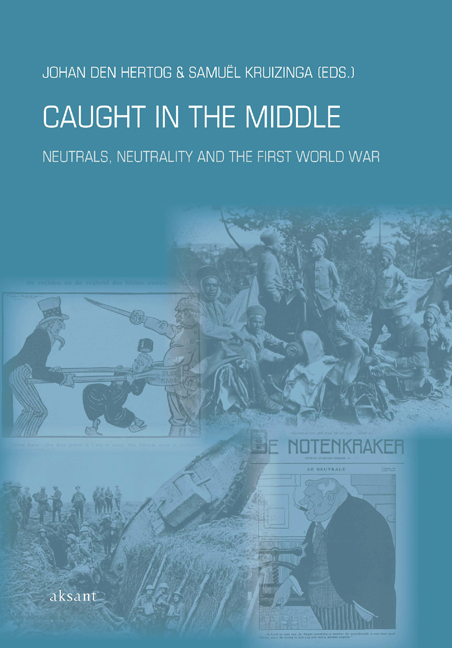Book contents
- Frontmatter
- Contents
- Acknowledgements
- Chapter 1 Introduction
- Chapter 2 Dutch Neutrality and the Value of Legal Argumentation
- Chapter 3 ‘Upon the Neutral Rests the Trusteeship of International Law’: Legal advisers and American unneutrality
- Chapter 4 Spanish Neutrality During the First World War
- Chapter 5 Britain’s Global War and Argentine Neutrality
- Chapter 6 NOT Neutrality: The Dutch government, the Netherlands Oversea Trust Company, and the Entente blockade of Germany, 1914-1918
- Chapter 7 From Parasite to Angel: Narratives of neutrality in the Swedish popular press during the First World War
- Chapter 8 Colour-blind or Clear-sighted Neutrality?: Georg Brandes and the First World War
- Chapter 9 The Hottest Places in Hell?: Finnish and Nordic neutrality from the perspective of French foreign policy, 1900-1940
- Chapter 10 The Other End of Neutrality: The First World War, the League of Nations, and Danish neutrality
- About the Contributors
Chapter 4 - Spanish Neutrality During the First World War
Published online by Cambridge University Press: 28 January 2021
- Frontmatter
- Contents
- Acknowledgements
- Chapter 1 Introduction
- Chapter 2 Dutch Neutrality and the Value of Legal Argumentation
- Chapter 3 ‘Upon the Neutral Rests the Trusteeship of International Law’: Legal advisers and American unneutrality
- Chapter 4 Spanish Neutrality During the First World War
- Chapter 5 Britain’s Global War and Argentine Neutrality
- Chapter 6 NOT Neutrality: The Dutch government, the Netherlands Oversea Trust Company, and the Entente blockade of Germany, 1914-1918
- Chapter 7 From Parasite to Angel: Narratives of neutrality in the Swedish popular press during the First World War
- Chapter 8 Colour-blind or Clear-sighted Neutrality?: Georg Brandes and the First World War
- Chapter 9 The Hottest Places in Hell?: Finnish and Nordic neutrality from the perspective of French foreign policy, 1900-1940
- Chapter 10 The Other End of Neutrality: The First World War, the League of Nations, and Danish neutrality
- About the Contributors
Summary
Spain's international policy during the First World War was primarily characterised by its restricted room for manoeuvring. This had both foreign and domestic reasons, both of which can be traced back to the position the country found itself in after the disastrous 1898 Spanish-American War, which had definitely ended Spain's Great Power ambitions. Internal strife followed, ensuring the country was unsuccessful in repairing the economic, military and naval deficiencies that had become so apparent during the war with the United States. This caused the country to sign defensive treaties with both Britain and France guaranteeing its remaining overseas possessions, which, in turn, gave both countries great leverage over Spain's foreign policy. When the First World War broke out, the Entente could therefore easily pressure Spain into economic concessions. However, maintaining neutrality was seen both as a key component in quelling national unrest and in Spain's own attempts to regain something of its lost status. This article will explore the roles of Spain's successive wartime governments and of its king in maintaining the country's neutrality.
Nature and content of Spanish neutrality
In the years before the outbreak of war, Spain had only participated in European power politics in a very marginal way. Most importantly, it had signed the Cartagena agreement of 1907, which bound Spain, France and Britain to consult each other when the territorial status quo of their Atlantic or Mediterranean possessions was under threat. However, when the events of July and August 1914 unfolded, Spain was more concerned with its internal conflicts. It was ignored and considered once again as a quantité négligeable by the countries of the Entente, which did not need to take Spain to war, but which they could manipulate without it being an official ally. Once the war started the participation of Spain, with an ill-equipped army, could help little in a war which was presumed to be short.
The Spanish government, presided over by the conservative Eduardo Dato, published a decree on 30 July declaring the strict neutrality of the Spanish state. King Alfonso xiii also supported neutrality, hoping that this would allow him to mediate between the belligerents, thereby strengthening Spain's international reputation. He hoped this would enable Spain once again to play a significant role in world politics.
- Type
- Chapter
- Information
- Caught in the MiddleNeutrals, Neutrality and the First World War, pp. 53 - 66Publisher: Amsterdam University PressPrint publication year: 2012



